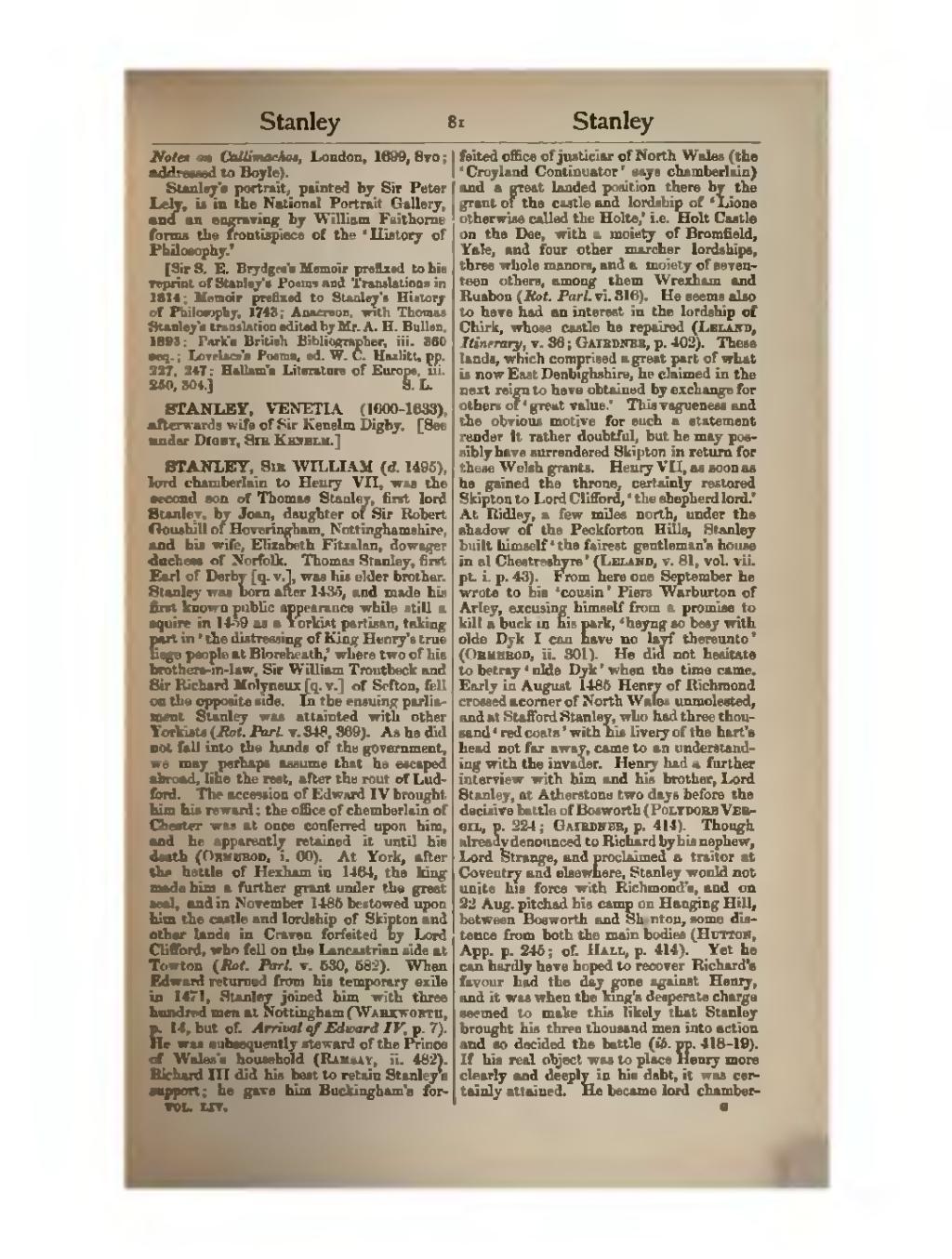Notes on Callimachos, London, 1699, 8vo; addressed to Boyle).
Stanley's portrait, painted by Sir Peter Lely, is in the National Portrait Gallery; an engraving by William Faithorne forms the frontispiece of the ‘History of Philosophy.’
[Sir S. E. Brydges's Memoir prefixed to his reprint of Stanley's Poems and Translations in 1814; Memoir prefixed to Stanley's History of Philosophy, 1743; Anacreon, with Thomas Stanley's translation edited by Mr. A. H. Bullen, 1893; Park's British Bibliographer, iii. 360 seq.; Lovelace's Poems, ed. W. C. Hazlitt, pp. 227, 247; Hallam's Literature of Europe, iii. 250, 304; Wood's Fasti; Notes and Queries, 9th ser. ii. 122.]
STANLEY, VENETIA (1600–1633), afterwards wife of Sir Kenelm Digby. [See under Digby, Sir Kenelm.]
STANLEY, Sir WILLIAM (d. 1495), lord chamberlain to Henry VII, was the second son of Thomas Stanley, first lord Stanley, by Joan, daughter of Sir Robert Goushill of Hoveringham, Nottinghamshire, and his wife, Elizabeth Fitzalan, dowager duchess of Norfolk. Thomas Stanley, first Earl of Derby [q. v.], was his elder brother. Stanley was born after 1435, and made his first known public appearance while still a squire in 1459 as a Yorkist partisan, taking part in ‘the distressing of King Henry's true liege people at Bloreheath,’ where two of his brothers-in-law, Sir William Troutbeck and Sir Richard Molyneux [q. v.] of Sefton, fell on the opposite side. In the ensuing parliament Stanley was attainted with other Yorkists (Rot. Parl. v. 348, 369). As he did not fall into the hands of the government, we may perhaps assume that he escaped abroad, like the rest, after the rout of Ludford. The accession of Edward IV brought him his reward; the office of chamberlain of Chester was at once conferred upon him, and he apparently retained it until his death (Ormerod, i. 60). At York, after the battle of Hexham in 1464, the king made him a further grant under the great seal, and in November 1465 bestowed upon him the castle and lordship of Skipton and other lands in Craven forfeited by Lord Clifford, who fell on the Lancastrian side at Towton (Rot. Parl. v. 530, 582). When Edward returned from his temporary exile in 1471, Stanley joined him with three hundred men at Nottingham (Warkworth, p. 14, but cf. Arrival of Edward IV, p. 7). He was subsequently steward of the Prince of Wales's household (Ramsay, ii. 482). Richard III did his best to retain Stanley's support; he gave him Buckingham's forfeited office of justiciar of North Wales (the ‘Croyland Continuator’ says chamberlain) and a great landed position there by the grant of the castle and lordship of ‘Lione otherwise called the Holte,’ i.e. Holt Castle on the Dee, with a moiety of Bromfield, Yale, and four other marcher lordships, three whole manors, and a moiety of seventeen others, among them Wrexham and Ruabon (Rot. Parl. vi. 316). He seems also to have had an interest in the lordship of Chirk, whose castle he repaired (Leland, Itinerary, v. 36; Gairdner, p. 402). These lands, which comprised a great part of what is now East Denbighshire, he claimed in the next reign to have obtained by exchange for others of ‘great value.’ This vagueness and the obvious motive for such a statement render it rather doubtful, but he may possibly have surrendered Skipton in return for these Welsh grants. Henry VII, as soon as he gained the throne, certainly restored Skipton to Lord Clifford, ‘the shepherd lord.’ At Ridley, a few miles north, under the shadow of the Peckforton Hills, Stanley built himself ‘the fairest gentleman's house in al Chestreshyre’ (Leland, v. 81, vol. vii. pt. i. p. 43). From here one September he wrote to his ‘cousin’ Piers Warburton of Arley, excusing himself from a promise to kill a buck in his park, ‘beyng so besy with olde Dyk I can have no layf thereunto’ (Ormerod, ii. 301). He did not hesitate to betray ‘olde Dyk’ when the time came. Early in August 1485 Henry of Richmond crossed a corner of North Wales unmolested, and at Stafford Stanley, who had three thousand ‘red coats’ with his livery of the hart's head not far away, came to an understanding with the invader. Henry had a further interview with him and his brother, Lord Stanley, at Atherstone two days before the decisive battle of Bosworth (Polydore Vergil, p. 224; Gairdner, p. 414). Though already denounced to Richard by his nephew, Lord Strange, and proclaimed a traitor at Coventry and elsewhere, Stanley would not unite his force with Richmond's, and on 22 Aug. pitched his camp on Hanging Hill, between Bosworth and Shenton, some distance from both the main bodies (Hutton, App. p. 245; cf. Hall, p. 414). Yet he can hardly have hoped to recover Richard's favour had the day gone against Henry, and it was when the king's desperate charge seemed to make this likely that Stanley brought his three thousand men into action and so decided the battle (ib. pp. 418–19). If his real object was to place Henry more clearly and deeply in his debt, it was certainly attained. He became lord chamber-
